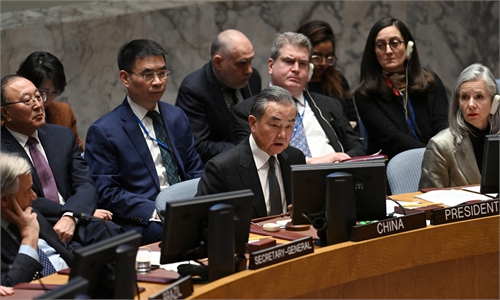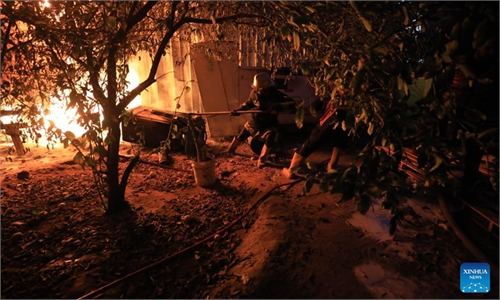Western leaders' intensifying pressure on Israel amid resurgence of Gaza hostilities 'hard to counter persisting divergence between conflicting sides'
Western leaders intensify pressure on Israel amid resurgence of hostilities in Gaza

Israeli tanks and troops are massed on the Israel-Gaza border as Israel continued its war against Palestinians on December 2, 2023 after the breakdown of negotiations. Photo: IC
Western leaders, including US Vice President Kamala Harris and French President Emmanuel Macron, intensified their pressure on Israel over the weekend amid the resurgence of hostilities between Israeli forces and Hamas militants after a weeklong cease-fire faltered. Chinese analysts on Sunday noted that despite growing vocal concerns from the US and Europe, their impact on the conflict might be limited due to the significant differences that persist between the conflicting parties.
The US vice president, who was in Dubai for the United Nations COP28 climate conference, said that "too many innocent Palestinians have been killed. Frankly, the scale of civilian suffering, and the images and videos coming from Gaza are devastating," Bloomberg reported on Sunday.
Macron also warned explicitly on Saturday on the sidelines of the COP28 talks that Israel's aim of eliminating the Palestinian militant group Hamas risked unleashing a decade of war.
The Western leaders' messages of grave concerns over the situation come after the resurgence of intense fighting between the conflicting Israeli army and Hamas militants on Friday and the Israeli side's indications that it intends to expand ground operations in the Gaza Strip.
Israel has carried out intense air strikes on Khan Younis in southern Gaza, with residents describing it as the heaviest bombing of the war, according to the BBC on Sunday. The Gaza-based Health Ministry said at least 193 people were killed in the latest wave of Israeli attacks.
The Israeli Defense Force announced on Saturday that it attacked 400 targets in the Gaza Strip during the past 24 hours, including 50 targets in Khan Younis, eliminating militants and destroying Hamas infrastructure. Israel said that Khan Younis, the second most important urban center in the Gaza Strip, has become a stronghold for most Hamas leaders and the bulk of its fighters and missile arsenal after they fled Gaza City and its north, Xinhua News Agency reported on Sunday.
Israeli Prime Minister Benjamin Netanyahu, in a press conference at Hakirya military base in central Tel Aviv, asserted on Saturday that Israel's ground operation in Gaza, which has resulted in fatalities, must continue to ensure the release of hostages. Netanyahu's remarks followed the withdrawal of his negotiation team from cease-fire talks with Hamas in Qatar. Netanyahu emphasized the necessity of the ground operation's expansion to achieve all of Israel's objectives, making it clear that a cease-fire without meeting these conditions would be considered unfeasible, according to Xinhua in a different report on Sunday.
Saleh al-Arouri, deputy head of Hamas's political bureau, told Al Jazeera on Saturday that "there are no negotiations now" and there would be no more prisoners exchanged with Israel until the war is over.
Before the seven-day cease-fire collapsed on Friday, 110 hostages were released, including 24 foreign nationals, while an estimated 135 hostages are still being held by Hamas and other militants in Gaza, according to Netanyahu.
The Israel Defense Forces' Arabic-language spokesperson posted maps on social media indicating which areas civilians should leave, directing people in areas east of Khan Younis to evacuate further south to shelters in Rafah, an indication that a ground offensive could be imminent.
The resurgence of intense fighting has laid bare just how huge the divergences are between the conflicting sides, and this gap will remain a major barrier toward peace in the foreseeable future, Liu Zhongmin, a professor at the Middle East Studies Institute of Shanghai International Studies University, told the Global Times on Sunday.
Liu explained that in essence, Hamas is seeking a complete end of the war and sees the release of hostages as a step toward this goal, while Israeli authorities continue to push for the total elimination of Hamas and therefore its hostilities would not stop even after all hostages are freed.
Chinese observers noted that the US and Europe are intensifying their pressure on the Israeli authorities in pursuit of a complete truce, however they believe the efforts are unlikely to reverse the short-term situation.
The continued Israel-Gaza war will not only further isolate Israel in the international community, but also test Netanyahu's own political career at home, Liu said.
Observers pointed out that having failed to persuade Israel to bring an end to the war that has killed more than 15,000 civilians and counting day by day, the US ruling Democratic Party, which paints itself as a defender of human rights, is facing mounting pressure as the 2024 general election approaches.



